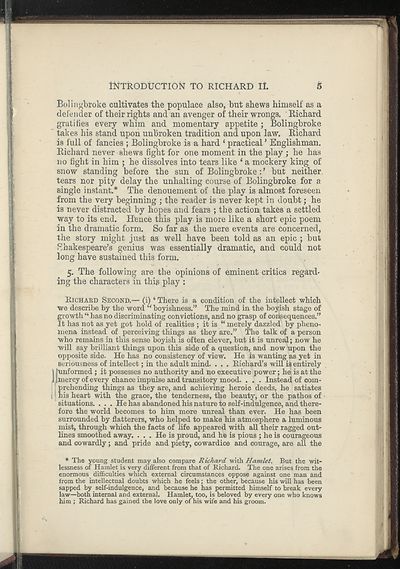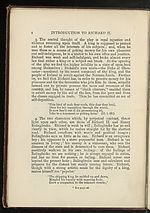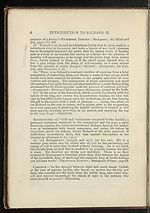Download files
Complete book:
Individual page:
Thumbnail gallery: Grid view | List view

Introduction to richard ii.
5
Eolingbroke cultivates the populace also, but shews himself as a
defender of their rights and an avenger of their wrongs. Richard
gratifies every whim and momentary appetite ; Bolingbroke
takes his stand upon unbroken tradition and upon law. Richard
is full of fancies ; Bolingbroke is a hard ‘ practical ’ Englishman.
Richard never shews fight for one moment in the play ; he has
no fight in him ; he dissolves into tears like ‘ a mockery king of
snow standing before the sun of Bolingbroke: ’ but neither
tears nor pity delay the unhalting course of Bolingbroke for a
single instant.* The denouement of the play is almost foreseen
from the very beginning ; the reader is never kept in doubt; he
is never distracted by hopes and fears ; the action takes a settled
way to its end. Hence this play is more like a short epic poem
in the dramatic form. So far as the mere events are concerned,
the story might just as Well have been told as an epic ; but
Shakespeare’s genius was essentially dramatic, and could not
long have sustained this form.
5. The following are the opinions of eminent critics regard¬
ing the characters in this play :
Richard Second.— (i) ‘ There is a condition of the intellect which
we describe by the word “boyishness.” The mind in the boyish stage of
growth “ has no discriminating convictions, and no grasp of consequences.”
It has not as yet got hold of realities ; it is “ merely dazzled by pheno¬
mena instead of perceiving things as they are.” The talk of a person
who remains in this sense boyish is often clever, but it is unreal; now he
will say brilliant things upon this side of a question, and now upon the
opposite side. He has no consistency of view. He is wanting as yet in
seriousness of intellect; in the adult mind. . . . Richard’s will is entirely
I lunformed ; it possesses no authority and no executive power; he is at the
II mercy of every chance impulse and transitory mood. . . . Instead of com¬
prehending things as they are, and achieving heroic deeds, he satiates
his heart with the grace, the tenderness, the beauty, or the pathos of
situations. . . . He has abandoned his nature to self-indulgence, and there¬
fore the world becomes to him more unreal than ever. He has been
surrounded by flatterers, who helped to make his atmosphere a luminous
mist, through which the facts of life appeared with all their ragged out¬
lines smoothed away. . . . He is proud, and he is pious ; he is courageous
and cowardly; and pride and piety, cowardice and courage, are all the
* The young student may also compare Richard with Hamlet. But the wit¬
lessness of Hamlet is very different from that of Richard. The one arises from the
enormous _ difficulties which external circumstances oppose against one man and
from the intellectual doubts which he feels; the other, because his will has been
sapped by self-indulgence, and because he has permitted himself to break every
law—both internal and external. Hamlet, too, is beloved by every one who knows
him ; Richard has gained the love only of his wife and his groom.
5
Eolingbroke cultivates the populace also, but shews himself as a
defender of their rights and an avenger of their wrongs. Richard
gratifies every whim and momentary appetite ; Bolingbroke
takes his stand upon unbroken tradition and upon law. Richard
is full of fancies ; Bolingbroke is a hard ‘ practical ’ Englishman.
Richard never shews fight for one moment in the play ; he has
no fight in him ; he dissolves into tears like ‘ a mockery king of
snow standing before the sun of Bolingbroke: ’ but neither
tears nor pity delay the unhalting course of Bolingbroke for a
single instant.* The denouement of the play is almost foreseen
from the very beginning ; the reader is never kept in doubt; he
is never distracted by hopes and fears ; the action takes a settled
way to its end. Hence this play is more like a short epic poem
in the dramatic form. So far as the mere events are concerned,
the story might just as Well have been told as an epic ; but
Shakespeare’s genius was essentially dramatic, and could not
long have sustained this form.
5. The following are the opinions of eminent critics regard¬
ing the characters in this play :
Richard Second.— (i) ‘ There is a condition of the intellect which
we describe by the word “boyishness.” The mind in the boyish stage of
growth “ has no discriminating convictions, and no grasp of consequences.”
It has not as yet got hold of realities ; it is “ merely dazzled by pheno¬
mena instead of perceiving things as they are.” The talk of a person
who remains in this sense boyish is often clever, but it is unreal; now he
will say brilliant things upon this side of a question, and now upon the
opposite side. He has no consistency of view. He is wanting as yet in
seriousness of intellect; in the adult mind. . . . Richard’s will is entirely
I lunformed ; it possesses no authority and no executive power; he is at the
II mercy of every chance impulse and transitory mood. . . . Instead of com¬
prehending things as they are, and achieving heroic deeds, he satiates
his heart with the grace, the tenderness, the beauty, or the pathos of
situations. . . . He has abandoned his nature to self-indulgence, and there¬
fore the world becomes to him more unreal than ever. He has been
surrounded by flatterers, who helped to make his atmosphere a luminous
mist, through which the facts of life appeared with all their ragged out¬
lines smoothed away. . . . He is proud, and he is pious ; he is courageous
and cowardly; and pride and piety, cowardice and courage, are all the
* The young student may also compare Richard with Hamlet. But the wit¬
lessness of Hamlet is very different from that of Richard. The one arises from the
enormous _ difficulties which external circumstances oppose against one man and
from the intellectual doubts which he feels; the other, because his will has been
sapped by self-indulgence, and because he has permitted himself to break every
law—both internal and external. Hamlet, too, is beloved by every one who knows
him ; Richard has gained the love only of his wife and his groom.
Set display mode to:
![]() Universal Viewer |
Universal Viewer | ![]() Mirador |
Large image | Transcription
Mirador |
Large image | Transcription
| Antiquarian books of Scotland > Languages & literature > Shakespeare's Richard II > (7) |
|---|
| Permanent URL | https://digital.nls.uk/109384954 |
|---|
| Description | Thousands of printed books from the Antiquarian Books of Scotland collection which dates from 1641 to the 1980s. The collection consists of 14,800 books which were published in Scotland or have a Scottish connection, e.g. through the author, printer or owner. Subjects covered include sport, education, diseases, adventure, occupations, Jacobites, politics and religion. Among the 29 languages represented are English, Gaelic, Italian, French, Russian and Swedish. |
|---|

